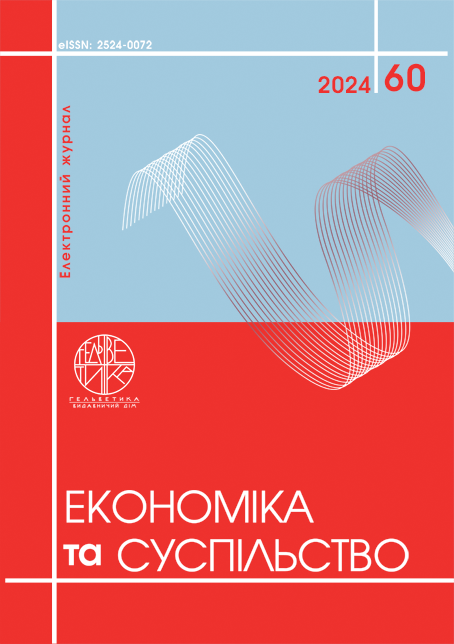QUALITY MANAGEMENT OF RESOURCES, SERVICES AND FACILITIES IN THE RESTAURANT BUSINESS
Abstract
In today's conditions, the restaurant business market is consolidating, merger and acquisition trends have emerged, which are exacerbated by the impact of crisis phenomena in the economy. The purpose of the article is the analysis and features of quality management of resource provision, service and services in the restaurant business, which is a tool for ensuring competitiveness and development prospects in the conditions of an unstable economic environment. Two approaches to studying the needs of restaurant customers have been established, the first approach takes into account the aspects of socio-economic factors, and the second approach is behavioral, which consists in studying the subjective forms of manifestation of the laws of the development of needs. The technique of forming the optimal assortment and price using economic and mathematical models is effective. In order to analyze the assessment of the implementation of the marketing approach to enterprise management, criteria are proposed by indicators: by product, by price, by promotion, sales, by material indicators and by the method of offering services. It is extremely important to periodically evaluate the economic and psychological effectiveness of a set of measures to improve customer service. For the effective functioning of restaurants, it is necessary to constantly analyze the needs of customers, the location of the restaurant, product, price and other policies. Studies show that the use of mechanisms for improving services in the field of restaurant business and modern management models in the activity of restaurants increase the company's turnover by 10-15%, profit by 11-15%, profitability by 2-3%. Activities to improve customer service in restaurants should be aimed at making the entire service process as visible as possible. The visibility of the service process, documented in various forms, allows for the analysis of the service process itself and the tasks involved in this process, which will allow improving the restaurant service and can serve as a basis for the strategic development of new development concepts. Improving the organization of services in the field of restaurant business requires constant analysis, development and observance of mechanisms that contribute to increasing the efficiency of management decision-making.
References
Міценко Н., Воронко Н., Боднарюк В., Кабаці Б. Бізнес-аналітика як стратегічний ресурс розвитку та реалізації потенціалу підприємства. Вісник Хмельницького національного університету. 2022. №6(2). С. 129–135.
Turetken O., Jethefer S., Ozkan B. Internal audit effectiveness: operationalization and influencing factors. Managerial Auditing Journal. 2020. Vol. 35. №. 2. Р. 238–271.
Bedradina G., Nezdoyminov S. Measuring quality of the tourism product in the tour operator business. Montenegrin Journal of Economics. 2019. Vol. 15. N. 2. P. 81–93. DOI https://doi.org/10.14254/1800-5845/2019.15-2.7
Schnegg M., Möller K. Strategies for data analytics projects in business performance forecasting: a field study. Journal of Management Control. 2022. №33. С. 241–271.
Шинкаренко В., Шинкаренко Л. Використання математичних методів для оптимізації туристичного продукту. Науковий вісник Міжнародного гуманітарного університету. 2016. № 20. С. 104–108.
Markowitz H. Foundations of Portfolio Theory. Journal of Finance. 1991. Vol. 46. Issue 2. P.469–477. URL; http://www.e-m-h.org/Mark91.pdf (дата звернення 12.03.2024).
Micenko N., Voronko N., Bodnaryuk V., Kabaci B. (2022). Biznes-analityka yak stratehichnyy̆ resurs rozvytku ta realizatsiï potentsialu pidpryiemstva [Business analytics as strategic resources for the development and implementation of core expertise.] Visnik Hmelnickogo nacionalnogo universitetu, vol.6(2), pp.129–135 [Іn Ukrainian].
Turetken, O & Jethefer S & Ozkan B. (2022). Internal audit effectiveness: operationalization and influencing factors. Managerial Auditing Journal, vol. 35, 2, P.238–271.
Bedradina, G. & Nezdoyminov, S. (2019). Measuring quality of the tourism product in the tour operator business. Montenegrin Journal of Economics. Vol. 15, no.2. P.81–93. DOI https://doi.org/10.14254/1800-5845/2019.15-2.7
Schnegg M., Möller K. (2022). Strategies for data analytics projects in business performance forecasting: a field study. Journal of Management Control, 33, 241–271.
Shynkarenko, V. & Shynkarenko, L. (2016). Vykorystannia matematychnykh metodiv dlia optymizatsii turystychnoho produktu [Use of mathematical methods to optimize the tourist product.] Naukovyy visnyk Mizhnarodnoho humanitarnoho universytetu. Vol.20. pp.104–108. [In Ukrainian].
Markowitz, H. (1991). Foundations of Portfolio Theory. Journal of Finance. Vol.46, 2, P. 469–477. Retried from http://www.e-m-h.org/Mark91.pdf

This work is licensed under a Creative Commons Attribution 4.0 International License.


